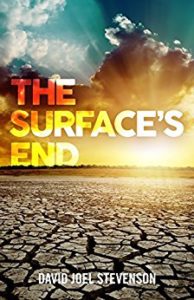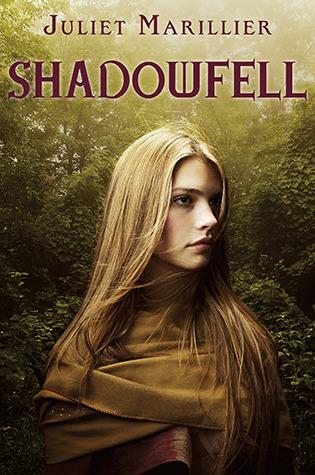The Surface’s End by David Joel Stevenson is a post-apocalyptic sci-fi that follows teenager Jonah Whitfield, a hunter living in a small town at the edge of the Deathlands. Even though his hometown is full of lush greenery, the Deathlands nearby are a desert wasteland stretching on for what seems like eternity, with an unnaturally sudden change between the two.
While out hunting one afternoon, Jonah’s prey darts into the Deathlands, and he follows, stumbling upon a hatch in the ground. He returns over the next week, drawn to the curious hatch, and finally manages to open it, revealing a tunnel down into the ground.
 The beginning of the book starts out a bit slow. We get a lot of details about Jonah’s family, his town, and some hints as to what happened in the past that our modern way of life no longer exists. Despite being post-apocalyptic, Jonah’s life is actually pretty great. He has a loving family, the world has not descended into anarchy despite the lack of established government, nor is there a dystopian government ruling over everything with an iron fist (at least, not in his world).
The beginning of the book starts out a bit slow. We get a lot of details about Jonah’s family, his town, and some hints as to what happened in the past that our modern way of life no longer exists. Despite being post-apocalyptic, Jonah’s life is actually pretty great. He has a loving family, the world has not descended into anarchy despite the lack of established government, nor is there a dystopian government ruling over everything with an iron fist (at least, not in his world).
I had a bit of a difficult time believing that society would have completely forgotten all about the world that came before the destruction that wiped out a good portion of humanity. Even if they no longer have working technology, they would still have books and left-over infrastructure, and I couldn’t imagine that people wouldn’t try to keep their knowledge of the past alive. However, we do only see a small portion of the world, Jonah’s hometown, which is pretty secluded, so it’s possible that this knowledge was kept alive in other locations.
The beginning is slow to give us a detailed sense of the “normal” world, at least from Jonah’s perspective. That way, we really feel how foreign the underground society he discovers is (though it may seem uncomfortably familiar in some ways). When Jonah descends into the hatch, he finds himself in a strange dystopian facility. At first he acts as an observer, hiding in small crevices and watching the family he comes across.
Read further beneath the surface




